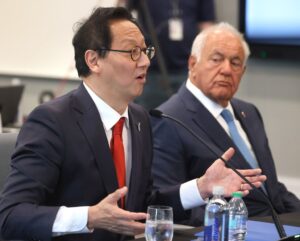University of Iowa Initiates Task Force for Digital Accessibility Compliance
The University of Iowa is taking proactive measures to ensure digital accessibility by forming a specialized Accessibility Task Force. This initiative is in response to a new mandate by the U.S. Department of Justice under Title II of the Americans with Disabilities Act, which requires that all web content and mobile applications be accessible by April 24, 2026.
Spearheaded by Steve Fleagle, associate vice president and chief information officer of Information Technology Services, and Liz Tovar, executive officer and associate vice president of the Division of Access, Opportunity, and Diversity, the task force has a significant mission. “Our goal is to ensure that all digital content and systems are accessible to everyone,” Fleagle emphasizes. “This is not just about compliance; it’s about creating a path forward where everyone can access the information and services they need.”
The task force’s primary responsibilities include evaluating and prioritizing digital content and systems based on their usage and accessibility, alongside devising a remediation process aligned with the Web Content Accessibility Guidelines 2.1 Level AA standards. They will engage in extensive training, continuous testing, and will liaise with third-party vendors to meet these compliance standards. An exception process for certain content types, regular audits, and policy updates are also on the agenda to sustain accessibility efforts.
Liz Tovar highlights the importance of this initiative by stating, “Ensuring compliance with Title II is crucial and required for our university. It demonstrates our commitment to accessibility for all members of our community and builds on our strategic goal of providing a welcoming and respectful environment for all Hawkeyes.”
These adjustments impact the university’s digital landscape, encompassing classroom coursework, research, health care, and athletics. The task force aims to lead this comprehensive effort, collaborating with existing groups to maintain compliance, consistency, and efficiency while avoiding redundant efforts.
The task force will be co-chaired by Maggie Jesse, executive director of the Office of Teaching, Learning, and Technology, and Tiffini Stevenson Earl, senior director of the Office of Civil Rights Compliance and ADA coordinator. Members include:
- Mirra Anson, director, student academic success and strategic initiatives, Office of the Executive Vice President and Provost
- Kirk Corey, director of policy and user services, Information Security and Policy Office, ITS
- Karmen Dillon, executive IT director, Application Services, UI Health Care
- Eddie Etsey, associate athletics director, Technology and Data Analytics, Department of Athletics
- Erin Feltes, deputy counsel, Office of General Counsel
- Ethan Fry, senior application developer, UI Health Care
- Brandon Mills, senior IT director, Division of Student Life
- Michael O’Neill, director of web strategy, Office of Strategic Communication
- Maureen Schafer, assistant provost and director, Academic Advising Center
- Charlie Taylor, chief of staff and communications, DAOD
- Mike Venzon, director, Student Disability Services, Division of Student Life
- T.M. Weissenberger, digital accessibility coordinator, Security Office, ITS
- Mike Frangi, director, Project Management, ITS
Steps for Faculty and Staff
As the task force embarks on its mission, university faculty and staff are encouraged to familiarize themselves with the new regulations and consider their impact on daily operations. Here are some recommended actions:
- Educate yourself: Learn about the Web Content Accessibility Guidelines Version 2.1, Level AA, to understand digital accessibility requirements.
- Assess your content: Review your digital content and systems to identify improvement areas to meet the new standards.
- Seek training: Participate in training sessions and workshops on digital accessibility to gain the necessary knowledge and skills.
- Collaborate: Work with colleagues and the Accessibility Task Force to share best practices and resources for compliance.
- Provide feedback: Utilize feedback mechanisms established by the task force to report accessibility issues and suggest improvements.
Contributing to an accessible digital environment at the University of Iowa is a shared responsibility. For questions or further information, contact Maggie Jesse (maggie-jesse@uiowa.edu) or Tiffini Stevenson Earl (tiffini-stevenson-earl@uiowa.edu).
Read More Here











